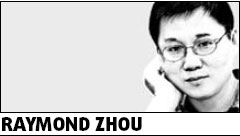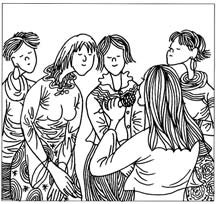What is really behind a TV reality show?
By Raymond Zhou (China Daily)Updated: 2007-07-07 07:19
 It is always interesting to watch foreign media react to
phenomena in China of such complexity that they do not fit into clear-cut
Western interpretations. The television reality show is a case in point.
It is always interesting to watch foreign media react to
phenomena in China of such complexity that they do not fit into clear-cut
Western interpretations. The television reality show is a case in point.
When The Supergirls first made it big in 2005, most domestic pundits saw a glimmer of democracy in the making as the wave of short-message votes swept candidates to instant popularity. On the other hand, several foreign commentators brushed aside the political implication and attributed the craze to behind-the-scenes maneuvering of business interests.
Now the tide has turned. A female director is described by The Times as daring to "defy both the will of the people and China's answer to Simon Cowell" when she said she might not cast the winners of a television contest show in a television drama series, as she was supposed to.
Let's pause for a moment and make an effort to define "the will of the people".
Do a million votes constitute "the will of the people"? What about five million? What if half the votes were cast by one person with deep pockets? What if the whole voting process was rigged by a producer who could make the Florida recount look like kid's play?
It seems outsiders are taking our television voting very seriously while we
ourselves have long put it through the grinding machine of
anything-for-entertainment. Try telling the story of The Quiz Show to a Chinese
television viewer, and a likely response would be: "What's the big deal?" 
I cannot tell you for sure which of China's reality shows is corrupt. Last year, someone successfully predicted the winner of one of the top rated shows week after week - days before each competition was held. Just imagine what the chances were for an educated guesser to hit that kind of bullseye.
To make you Jimmy Carter wannabes more agog, some suggest this could be the stroke of genius - not by a renegade or a rival station, but by the producers themselves. In China's entertainment industry, most scandals are created by the defamed stars or their managers because it is a more effective way to get exposure, and exposure entails a higher asking price for the next project.
I once grilled a friend of mine from the inner circle of another reality show, and he gave me a quizzical look: "I can tell you responsibly that the voting was not fixed." He put special emphasis on the word "responsibly" as if he were imitating some official facing the press.
Of course, this was not proof one way or the other. On the other hand, it does not take a UN election watcher to know someone tampered with the outcome. Just follow one episode and you'd get a feeling of who is buying votes in bulk and who is getting a nudge from the producer.
The crux is not whether the process of a reality show is fair and transparent - are you out of your mind to expect a thing like that in a seriously frivolous environment like ours? The real point is, why do producers pretend to be fair and transparent in the first place?
The answer is simple: It makes them more money. The illusion of democracy tends to create euphoria among the target audience so that they will be more willing to punch their cellphones to see their favorite candidates survive another round of contest. In China, reality programming rakes in more profits from paid votes than from advertising.
You may see a television contest as the rough copy of a democratic system, but it is more like a clownishly rotten copy.
Email: raymondzhou@chinadaily.com.cn
(China Daily 07/07/2007 page4)
|
|
|
|